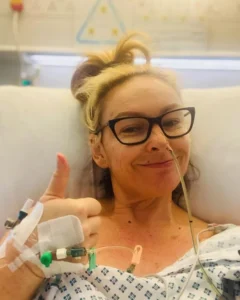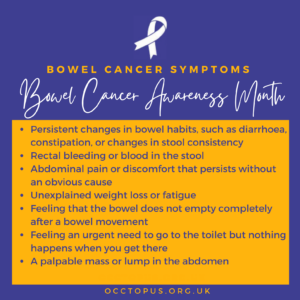We are excited to announce Mel Schilling us our new celebrity ambassador!

TV star, Mel Schilling, is sharing details of her bowel cancer diagnosis this Bowel Cancer Awareness Month, to highlight the symptoms and the risk factors associated with the disease.
The Married At First Sight star, 52, was diagnosed just before Christmas 2023 after she began experiencing symptoms while filming the Australian version of the show.
She soon became concerned after losing her appetite, resulting in rapid weight loss, and she was in so much pain that she struggled to hold down food or water. She didn’t have blood in her poo, only stomach cramps and constipation. Then later, an inability to hold anything in her stomach resulting in severe vomiting. Following a GP appointment about these symptoms, Mel was referred for a CT scan which confirmed she had bowel cancer.
Mel, who is mum to daughter Maddie, underwent laparoscopic surgery, a form of keyhole surgery, at a London based hospital in December 2023 to remove the tumour and was back at work within weeks. The form of chemotherapy she is currently getting is not too taxing on the body so she is carrying on working throughout the treatment as normal.
As well as raising awareness, Mel wants to change the negative narrative around a bowel cancer diagnosis and comments: “It is really important to me to demystify a bowel cancer diagnosis and put people at ease about it. It doesn’t always mean a negative outcome or a drastic impact on your everyday life, so don’t assume the worst if you start noticing any of the bowel cancer symptoms and don’t let a fear of it delay you from getting it checked out.
“My surgery was a 90 minute key-hole procedure under general anaesthetic and spinal block. I was in hospital for 5 days and went back to my normal eating and loo habits soon after the operation.
“Three weeks post surgery, I was back at work (one day per week). I’d say my energy levels are at about 70% now that I’m on chemo and I’m experiencing a little fatigue, bloating and nausea, but nothing too taxing. My prognosis is good and I am feeling positive and confident about the future.
Our charity Chair, Professor Sir Neil Mortensen explains: “Bowel cancer has a high survival rate and there are good prospects in colorectal cancer treatment as it is a very treatable cancer if it is found early. Typically, 85% of patients are alive two years after major colorectal surgery.

“But for treatment to be quick and effective, the cancer needs to be caught early. Therefore, it is vital you get to know your body and what is right for you and push for a second opinion if you think something isn’t right.
“Also, due to huge advancements in surgical techniques and robotics, the surgery to remove the cancer can be minimally invasive with a quick recovery time to avoid heavily disrupting the patient’s day to day life.
This Bowel Cancer Awareness Month, Occtopus is highlighting the signs and symptoms to drive early detection and better patient outcomes. The symptoms include, but are not limited to, the following:

In addition to the symptoms, the charity is also raising awareness of the risk factors to help reduce the chances of developing bowel cancer. These are not limited to, but are outlined below, and can affect anyone at any age from teenagers to those in their nineties:

Professor Sir Neil Mortensen, who is also Chair of the Board for the National Cancer Audit Collaborating Centre, continues: “In addition to the importance of early detection, prevention is key and is possible if lifestyles are altered.”
“It is crucial for everyone to be proactive in discussing any concerns with their healthcare providers and undergoing appropriate screening tests as recommended by the NHS, including the free FIT test for everyone over 60.
“We want to empower individuals to reduce their risk factors, recognise the warning signs and take action as soon as they notice something is not right, as early detection significantly improves patient outcomes.
Mel Schilling concludes: “By promoting awareness and reducing the fear factor around bowel cancer, we can make a tangible difference in preventing and fighting the disease. No one should delay raising concerns about a change in bowel habit due to a worry about what might be ahead, because if caught early, a bowel cancer diagnosis can have a very positive outcome and treatment doesn’t need to turn your life upside down.”


